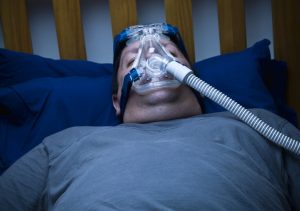
In this blog, the board-certified sleep doctors at eos sleep explain more about how being overweight and sleep apnea are linked.
What is sleep apnea?
Sleep apnea is a common sleep disorder that often goes undiagnosed. It’s characterized by pauses in breathing as you sleep, occurring 30 or more times an hour and lasting from a few seconds to minutes each.
In addition to disrupting your natural sleep cycle and leaving you feeling fatigued in the morning, sleep apnea can cause symptoms that include the following:
- Loud chronic snoring
- Gasping, choking, or snorting sounds as you sleep
- Irritability
- Depression
- Difficulty focusing and remembering
- Morning headaches
- Increased risk of developing heart disease, type 2 diabetes, and other chronic diseases
How does excess weight affect sleep apnea?
The most common type of sleep apnea, obstructive sleep apnea (OSA), is caused when your airway collapses or is blocked as you sleep. This causes pauses in your breathing as well as snoring, which happens when air squeezes past the blockages.
Although anyone can have obstructive sleep apnea, it’s more common in people who are overweight. Especially if you’re carrying weight in your trunk and neck area, your airway may be narrowed and tissues and organs can swell. This reduces the room where oxygen can travel.
Being overweight and sleep apnea are also linked because if you have sleep apnea, it increases your risk of becoming obese. When you’re deprived of sleep, your body can have higher levels of a hormone (ghrelin) that increases appetite and lower levels of another hormone (leptin) that sends a signal to the brain that you’re full and satisfied.
Sleep apnea can also affect the way your body uses insulin. This hormone moves glucose (sugar) out of the blood and into your cells, where it’s converted into energy. When you don’t sleep well, your cells block this effort, which can increase your risk of gaining weight and developing type 2 diabetes.
What are the treatment options?
A sleep study may be performed to confirm the presence of sleep apnea. Once a diagnosis is made, the following are some common treatment options:
- Losing excess weight: If you have sleep apnea and need to lose weight, taking action in one area can help improve the other. Losing excess weight can help improve your sleep apnea symptoms, and improving your sleep apnea symptoms can also help you lose extra weight.
- CPAP machine – A continuous positive airway pressure machine delivers a constant steady stream of air through a hose and mask to help keep your airway open.
- Oral appliance – Worn only at night, custom devices are similar to sports mouth guards. They help prevent your tongue and soft palate from collapsing in the back of the throat and blocking your airway.
If your sleep apnea hasn’t improved enough after using conservative treatments, are procedure may be recommended to correct its underlying cause.
Options include the following:
- Palate Coblation – By utilizing radio frequency energy, this procedure stiffens the soft palate.
- Balloon sinuplasty – This procedure treats sinus-related sleep apnea by inflating and removing a tiny balloon in your sinus cavities to help clear and enlarge them.
- Radiofrequency ablation of the tongue – The base of the tongue is shrunk and tightened using radiofrequency energy.
- Pillar procedure – The soft palate is stiffened by inserting small implants.
- Coblation turbinate reduction – Radiofrequency energy is used to reduce the size of enlarged nasal turbinates (structures on the side wall of the inside of the nose).
- Laser-assisted uvulopalatoplasty (LAUP) – Shrinks the size of an enlarged or elongated uvula by using laser technology.
- Laser-assisted tonsil ablation – Uses laser technology to reduce the size of your tonsils.
- Latera – This tiny implant helps give cartilage support to a collapsed nasal wall.
- Functional endoscopic sinus surgery (FESS) – A small instrument is inserted into the sinus openings, and small amounts of bone or tissue that are causing blockages are removed.
- Septoplasty – Surgery that corrects a deviated septum – a crooked or off-center wall that separates your two nostrils.
- Genioglossus advancement – Surgery that pulls the main tongue muscle forward to expand and stabilize your airway.
If you’re overweight and are experiencing symptoms of sleep apnea such as chronic snoring and excessive sleepiness, make an appointment today for an evaluation at eos sleep. We offer the latest minimally invasive techniques for treating sleep apnea and will help you get back to sleeping and feeling better. In addition, we’ll answer any questions you have about being overweight and sleep apnea so you can have improvement with both issues.
